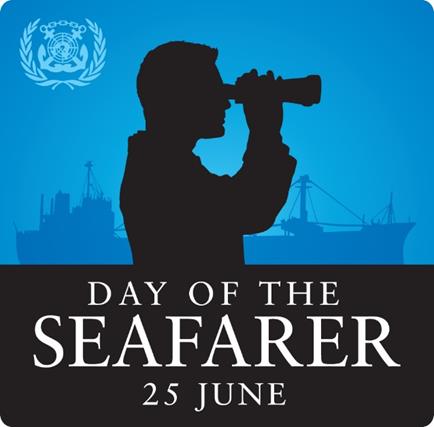International
Day of the Seafarer
 In 2010, the International Maritime Organization
(IMO) designated June 25 as the International Day of the Seafarer as a way
to recognize that almost everything that we use in our daily lives has been
directly or indirectly affected by sea transport. Some examples:
In 2010, the International Maritime Organization
(IMO) designated June 25 as the International Day of the Seafarer as a way
to recognize that almost everything that we use in our daily lives has been
directly or indirectly affected by sea transport. Some examples:
-
Items
made offshore are shipped in shipping containers by sea, then by rail and truck to a
local store for consumers to buy; or as parts to a local assembly plant
ex. vehicles.
-
Food
is transported, such as grain from Thunder Bay, and as it is exported, it
provides wages and taxes that enable Thunder Bay's economy to flourish.
-
Crude
oil is transported by ship and rail and processed at the refinery in Saint John NB, and gasoline
and fuel oil are transported by tanker in the Great Lakes, even to Thunder
Bay.
The purpose of the day is to give thanks to seafarers for
their contribution to the world economy and the civil society; and for the risks
and personal costs they bear while on their jobs.
Background
According to IMO's estimates, ships transport almost 90
percent of the world’s goods trade. Seafarers are not only responsible for the
operations of such ships, but are also responsible for the safe and smooth
delivery of the cargo. Some
facts (2017):
-
52,000
ships world wide;
-
1,647,000
seafarers world wide; and
-
US$614
International Labour Organization (ILO) minimum monthly basic wage for an Able Seaman; wages may be higher when
negotiated in a labour contract
The day not only acknowledges the invaluable work of
seafarers, but also aims to bring global attention to the issues affecting their
work and lives, such as piracy. It calls on governments to develop policies that
lead to fair treatment of seafarers at ports, and asks private ship companies
and owners to provide their employees proper facilities and comforts while they
are at sea.
www.imo.org
Mission
to Seafarers: Port of Thunder Bay Home Page
 In 2010, the International Maritime Organization
(IMO) designated June 25 as the International Day of the Seafarer as a way
to recognize that almost everything that we use in our daily lives has been
directly or indirectly affected by sea transport. Some examples:
In 2010, the International Maritime Organization
(IMO) designated June 25 as the International Day of the Seafarer as a way
to recognize that almost everything that we use in our daily lives has been
directly or indirectly affected by sea transport. Some examples: